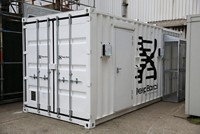Advertisement
Grab your lab coat. Let's get started
Welcome!
Welcome!
Create an account below to get 6 C&EN articles per month, receive newsletters and more - all free.
It seems this is your first time logging in online. Please enter the following information to continue.
As an ACS member you automatically get access to this site. All we need is few more details to create your reading experience.
Not you? Sign in with a different account.
Not you? Sign in with a different account.
ERROR 1
ERROR 1
ERROR 2
ERROR 2
ERROR 2
ERROR 2
ERROR 2
Password and Confirm password must match.
If you have an ACS member number, please enter it here so we can link this account to your membership. (optional)
ERROR 2
ACS values your privacy. By submitting your information, you are gaining access to C&EN and subscribing to our weekly newsletter. We use the information you provide to make your reading experience better, and we will never sell your data to third party members.
Biological Chemistry
Care for a glass of fresh-brewed mammoth milk?
Firms are making milk and leather with yeast instead of animals
by Melody M. Bomgardner
March 12, 2018
| A version of this story appeared in
Volume 96, Issue 11

Two start-ups developing processes to produce milk and leather using yeast instead of animals have received backing to help move their work out of the lab and closer to consumers.
Berkeley, Calif.-based Perfect Day, which aims to produce milk proteins via fermentation, raised $24.7 million in its first round of venture funding from Temasek, a Singaporean state-owned investment company; Hong Kong-based Horizons Ventures; and Inconiq Capital, a group of Silicon Valley investors.
Across the country in Nutley, N.J., Modern Meadow has struck a deal with German specialty chemical firm Evonik Industries. The companies will work together to scale up fermentation yield and output of collagen, which Modern Meadow uses to produce a material it calls bioleather. The investment firms that are behind Perfect Day are also investors in Modern Meadow.
Chief Technology Officer Dave Williamson says Modern Meadow wants to increase its scale by an order of magnitude and move into commercial production.
“Evonik is a clear leader in microbial fermentation, and their innovation and production capacity convinced us that they are the right partner for this critical program,” Williamson says. Evonik uses large-scale fermentation to make amino acids for its animal nutrition business.
While producing amino acids via fermentation is common industrial practice, making milk and leather proteins without the moo is a specialty process more akin to craft brewing. Both start-ups rely on yeast genetically altered to contain mammalian DNA.
According to a 2014 patent, Perfect Day’s modified yeast process can make the specific milk proteins of just about any animal, including humans, pandas, lemurs, whales, spiny anteaters, and even woolly mammoths.





Join the conversation
Contact the reporter
Submit a Letter to the Editor for publication
Engage with us on Twitter